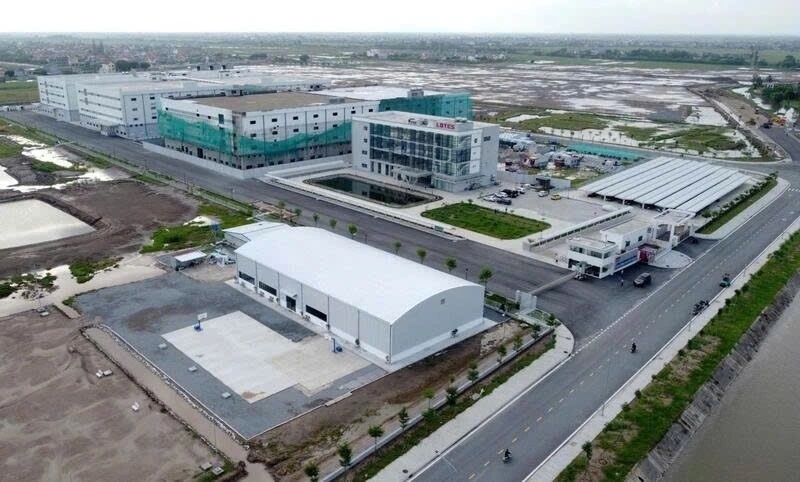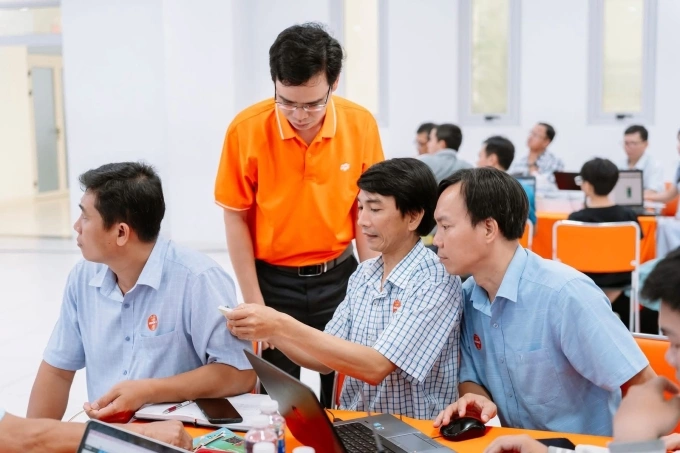Chiến dịch “STEM Education in the Age of AI” lan tỏa giáo dục AI đến hơn 15.000 giáo viên, học sinh giúp trường Đại học FPT được vinh danh tại The PIEoneer Awards – giải “Oscar ngành giáo dục”.
Đại diện trường nhận giải tại Toà thị chính London (Anh). Ảnh: Trường Đại học FPT
Lễ trao giải được tổ chức tại Guildhall, London (Anh), ngày 5/9, cùng sự tham gia của 148 đề cử ở 22 hạng mục. Trường Đại học FPT (FPTU) giành chiến thắng ở hạng mục Marketing Campaign of the Year (Chiến dịch truyền thông của năm) với dự án “STEM Education in the Age of AI” (Giáo dục STEM trong kỷ nguyên trí tuệ nhân tạo).
Việc giành giải thưởng này cũng đánh dấu lần đầu tiên một trường đại học tại Việt Nam được xướng tên ở hạng mục uy tín trong hệ thống giải thưởng giáo dục toàn cầu.
Đại diện trường cho biết, hạng mục trên hút sự quan tâm khi vinh danh những chiến dịch marketing sáng tạo và truyền cảm hứng trong giáo dục toàn cầu, mang lại tác động đo lường được. FPTU là đại diện duy nhất từ Việt Nam góp mặt trong danh sách chung kết cùng nhiều tổ chức giáo dục uy tín như Đại học Manchester, Đại học Oxford…
“STEM Education in the Age of AI” được FPTU triển khai trong bối cảnh trí tuệ nhân tạo (AI) đang trở thành yếu tố định hình lại giáo dục và thị trường lao động toàn cầu. Chiến dịch cung cấp khóa đào tạo AI miễn phí cho hơn 15.000 lãnh đạo trường học, giáo viên và học sinh tại Việt Nam cũng như quốc tế.
Chuỗi hoạt động của chiến dịch bắt đầu từ năm 2024, đến nay đã được triển khai rộng khắp. Trong đó, hội thảo “Hiệu trưởng 4.0” thu hút hơn 1.200 lãnh đạo nhà trường tham gia. Bên cạnh đó là các khóa đào tạo về ứng dụng AI trong giảng dạy dành cho 8.500 giáo viên.
Chiến dịch cũng tổ chức các chương trình học tập trải nghiệm AI cho hơn 3.600 học sinh. Ngoài ra, gần 4.700 giáo viên đã tham dự khóa “STEM in AI Era” theo cả hình thức trực tuyến và trực tiếp.
Khóa tập huấn STEM Education in AI Era. Ảnh: Trường Đại học FPT
Nội dung đào tạo được xây dựng đa dạng, bao gồm lập trình Python, Internet of Things (IoT), Robotics, cùng các ứng dụng AI trong thiết kế giáo án, thuyết trình và thực hiện dự án. Thông qua đó, chiến dịch góp phần nâng cao năng lực số cho đội ngũ giáo viên và học sinh.
Đại diện FPTU cho biết, đơn vị hướng đến đưa AI và STEM tới gần hơn với giáo dục phổ thông tại Việt Nam. Những hoạt động của chiến dịch đã được lan tỏa rộng rãi trên các kênh truyền thông uy tín trong và ngoài nước.
“STEM Education in the Age of AI” cũng thu hút hàng triệu lượt tiếp cận trực tuyến. Hàng Nghìn học sinh trực tiếp tham gia hoạt động trải nghiệm và nhận được sự đồng hành từ các doanh nghiệp công nghệ lớn. Chiến dịch góp phần hiện thực hóa mục tiêu của Nghị quyết 57-NQ/TW về phát triển nguồn nhân lực chất lượng cao trong kỷ nguyên số. Thông qua việc lan tỏa kiến thức và kỹ năng mới, chiến dịch đồng hành giáo viên và học sinh phổ thông trong hành trình chuẩn bị cho lực lượng lao động tương lai, những công dân số sáng tạo, tự tin, có trách nhiệm.
Trường tổ chức các cuộc thi, các sự kiện về AI và công nghệ dành cho học sinh, sinh viên. Ảnh: Trường Đại học FPT
Ngoài ra, FPTU còn là một trong những đơn vị giáo dục tiên phong tích cực trong tổ chức các hoạt động đào tạo, sự kiện giới thiệu các chương trình Công nghệ, AI đến cộng đồng xã hội như: các lớp học trực tuyến; sự kiện FPTU GenAI Day; dự án tập huấn “Chương trình Giáo dục STEM trong kỷ nguyên trí tuệ nhân tạo”; triển lãm công nghệ GenAI 2025… mỗi sự kiện, thu hút hàng ngàn người tham dự trải nghiệm.
FPTU là một trong những đơn vị giáo dục tiên phong trong việc tổ chức các hoạt động đào tạo và sự kiện giới thiệu chương trình công nghệ, trí tuệ nhân tạo (AI) đến cộng đồng. Trường triển khai nhiều hoạt động tiêu biểu như: lớp học trực tuyến, sự kiện FPTU GenAI Day, dự án tập huấn “Chương trình Giáo dục STEM trong kỷ nguyên trí tuệ nhân tạo”, triển lãm công nghệ GenAI 2025. Mỗi sự kiện đều thu hút hàng ngàn người tham dự và trải nghiệm thực tế.
Theo đại diện trường, chiến thắng trong giải thưởng này vừa thể hiện vị thế giáo dục của Việt Nam trên thế giới. Sự kiện cũng cho thấy cam kết của Trường Đại học FPT trong việc chú trọng đến trách nhiệm xã hội, thông qua những hành động cụ thể và đóng góp thiết thực cho cộng đồng.
The PIEoneer Awards là giải thưởng do The PIE (Professionals in International Education) tổ chức thường niên từ năm 2017. Giải thưởng nhằm vinh danh các sáng kiến và nỗ lực nổi bật trong giáo dục quốc tế. Danh sách đề cử được lựa chọn kỹ lưỡng bởi hội đồng giám khảo chuyên môn từ hàng trăm hồ sơ gửi về mỗi năm.
Trường Đại học FPT, thành lập năm 2006, trực thuộc Tập đoàn FPT – một trong những tập đoàn công nghệ hàng đầu tại Việt Nam. Nhà trường tiên phong ứng dụng công nghệ vào đào tạo với các định hướng rõ ràng như triết lý “AI First”, chương trình OJT (On-the-Job Training), mạng lưới hợp tác quốc tế với hơn 200 trường đại học và tổ chức giáo dục toàn cầu. Hiện nay, 98% sinh viên FPTU có việc làm trong vòng 12 tháng sau khi tốt nghiệp. Nhiều em đang làm việc tại các tập đoàn quốc tế lớn trên thế giới.
Nguồn: Vnexpress










